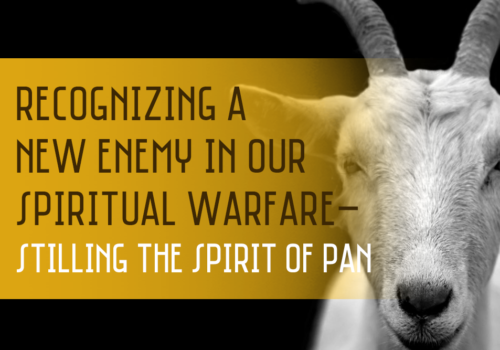Since Christ has defeated the principalities and powers we battle and they are truly disarmed, they work their skirmishes many times in subtle ways through lies and shams.
Paul said that he was not ignorant of Satan’s devices (see 2 Corinthians 2:11).
But as the father of lies, our adversary will use pretense and deceitfulness to wage war against us. That is why discernment is so important in today’s battles. We need to know what is true and false in our spiritual encounters.
In Matthew 16:1-4, Jesus addresses the idea of discernment:
“The Pharisees and Sadducees came up, and testing Jesus, they asked Him to show them a sign from heaven. But He replied to them, “When it is evening, you say, ‘It will be fair weather, for the sky is red.’ “And in the morning, ‘There will be a storm today, for the sky is red and threatening.’ Do you know how to discern the appearance of the sky, but cannot discern the signs of the times?” (Matthew 16:1-3 NASB).
The natural discernment was open to all who could see the sky. However, this was an illustration that followed the Jesus’ spiritual discernment as He discerned the insincerity of their request (cf. Matthew 16:1).
One key in the discerning process is to really “see” what is before you.
What stood before Jesus were not men desiring truth from Him, but His failure. This is the first time the combination of the Sadducees and Pharisees, who truly disliked each other, spoke collectively to Jesus. It seems their hatred for Him overshadowed their hatred for each other, or as A. T. Robertson said, “Hate makes strange bedfellows.”
Point being, if what you suddenly see before you is too good to be true (in the text a unity of dissenting parties) it probably is and needs to be a noted concern.
Jesus then speaks to what these men could not see—the times. What were the times He was speaking of?
“The signs of the time of the Messiah’s coming were upon them, and that Jesus was the Messiah; as the departure of the sceptre from Judah, the ending of Daniel’s weeks, the various miracles wrought by Christ, the wickedness of the age in which they lived, the ministry of John the Baptist, and of Christ, the great flockings of the people, both to one and to the other, with divers other things which were easy to be observed by them: but they pretend this to be a very great secret” (Gill).
Seeing spiritually what is truly before us can be difficult as we look through the lens of personal bias, prejudice, and justification. In our call to see, however, seeing alone is not an end to itself. So what can be our ‘lens cleaner’ to see rightfully?
Nearly all Bible-reading Christians are familiar with 1 Samuel 16:7 and the anointing of David over his brothers:
“But the Lord said to Samuel, “Do not look on his appearance or on the height of his stature, because I have rejected him. For the Lord sees not as man sees: man looks on the outward appearance, but the LORD looks on the heart.”
In turn, Isaiah says the same:
“And his [Christ] delight shall be in the fear of the LORD. He shall not judge by what his eyes see, or decide disputes by what his ears hear” (Isaiah 11:3 ESV).
Rather, He will judge with righteousness and equity, because the Spirit of the Lord shall rest upon Him.
It is the Holy Spirit who must clean the lens of our eyes so we may discern properly. It is the Holy Spirit who can allow us to see not as man, but as the Lord.
“Howbeit when he, the Spirit of truth, is come, he will guide you into all truth: for he shall not speak of himself; but whatsoever he shall hear, [emphasis mine] that shall he speak: and he will shew you things to come” (John 16:13 KJV).
Thus, the Holy Spirit will “hear” what the Lord “sees” and help us from looking through our own eyes.
In fact, discernment is a Holy Spirit gift (cf. 1 Corinthians 12:10). Classic New Testament examples of this gift in operation is seen in Acts 5 when Peter “saw” the deceit in Ananias, and Acts 16 when Paul “saw” past a true testimony (yes, they were servants of the most high God, and yes, they showed the way of salvation)–but given falsely in an attempt to deceive.
Not all discernment is as overtly supernatural like was seen with Peter and Paul. But all spiritual discernment must take root in the Holy Spirit.



